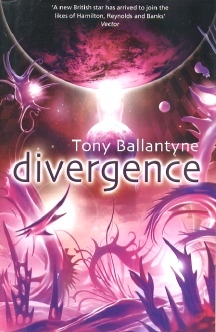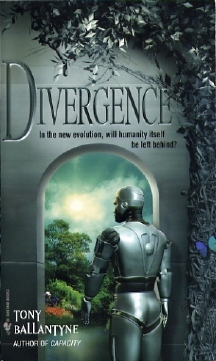Science fiction is particularly adept at asking and answering the big
questions. Such philosophical conundrums were once the sole province
of religious thinkers. Tony Ballantyne's 'Recursion' introduced readers
to a near future where the concept of free will took a good kicking
at the hands of The Watcher, an all-powerful AI born in this century
that may (or may not) have ended up controlling the fate of all human
kind, with the help of the perhaps mythical woman, Eva Rye. He followed
'Recursion' up with 'Capacity', set in worlds both virtual and "atomic",
once again examining the Augustinian concept of predestination, or
programming as it has become in the parlance of the genre. In that
novel, Ballantyne introduced Judy, an employee of The Watcher's "Social
Care", with a dozen digital duplicates playing over variations
on her life in virtual worlds. Judy's and the Watcher's story conclude
in 'Divergence', which indeed does no less than to ask and answer
the biggest questions of all. If Saint Augustine were writing science
fiction, we might hope it would come out as entertaining and thought-provoking
at these books.
The series is tightly woven, to the point where chapters from 'Recursion'
only get followed up in 'Divergence'. Read the books in order, and don’t
think of them as stand-alone works. That said, each novel does function
in its sort of virtual world, introducing new characters and situations
and admirably allowing the reader to make the big connections. As 'Divergence'
begins, we meet a group of passengers aboard the spacecraft Eva Rye.
When they come upon what may be a robot or a spaceship, they decide to
engage in a trade. In order to ensure that they aren't cheated, they
engage Fair Exchange (FE) software. What they receive in return is Judy,
along with orders to return her to Earth, not a choice destination. Now
the passengers are trapped in series of escalating exchanges that will
bring them in contact with Von Neumann Machines and things perhaps more
deadly.
'Divergence' benefits from a tightly focused opening that introduces
us to a small number of characters aboard the Eva Rye, really just a
spacefaring drawing room. Once this group engages the "Free Trade" software,
they're whittled down further. Edward is a slightly slow refugee from
Garvey's World, a planet infested with the BVB's and Schroedinger's Boxes
introduced in 'Capacity'. Maurice takes on the Captain's role even though
the FE software suggests Edward do so. Saskia is young, beautiful, and
headstrong. Miss Rose is elderly and spends lots of time in her room.
Judy, of course, is the virgin warrior. On their journey to Earth, they're
going to learn a lot about one another and about, well, the nature of
reality. What else is there to do in a drawing room in space?
Ballantyne has all sorts of fun in 'Divergence', successfully pulling
out the stops. You get software that may be the savior, wild hallucinogenic
visions of Von Neumann machines running rampant, the return of Chris
and the Watcher. Judy dreams that she is Eva Rye; not the space ship,
mind you, but the person, in segments that follow on directly from 'Recursion'.
Ballantyne also engages in lots of very funny humor based on physics
and other branches of science, using science fiction to literally bring
to life science's most famous feline. The humor is very odd, but really
quite engaging.
As the conclusion to a series, 'Divergence' does indeed provide all the
answers, in fact, at times a few more than one requires. He's perhaps
a tad overly thorough at tying up loose ends, but that's a close call,
and if he errs, he at least errs on the side over-informing the reader.
'Divergence' does keep up the very dense and packed feeling of the other
novels in the series. Each scene seems honed down to within a word of
its life.
Ballantyne's finale to the series is properly recursive and thoroughly
entertaining, even as he wrestles with big philosophical questions about
free will, predestination and the nature of capitalism. Ballantyne is
amazingly adept at setting up seemingly simple situations with complex
consequences. Particularly interesting are Ballantyne's notions about
capitalism, which, when viewed with his science-fictional lens, becomes
an insidious sentient computer virus, or perhaps an analogue for Christianity.
Though much of the novel is set aboard a spacecraft, with many elements
of space opera, those elements are made to serve a different master.
Ballantyne is using science fiction to tread through realms that were
once consecrated to religious thought. The results are entertainingly
intelligent.

